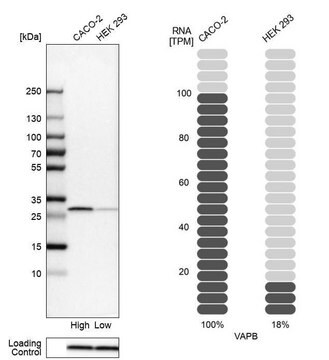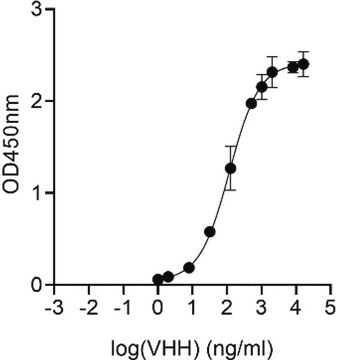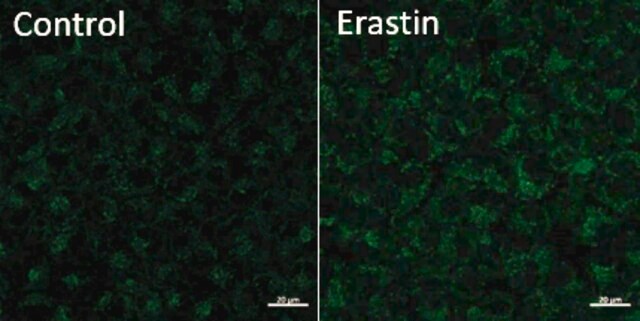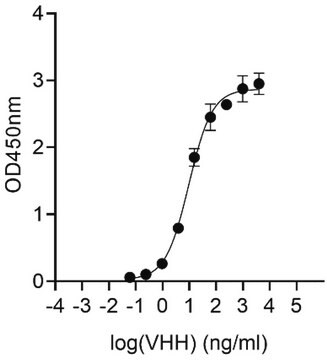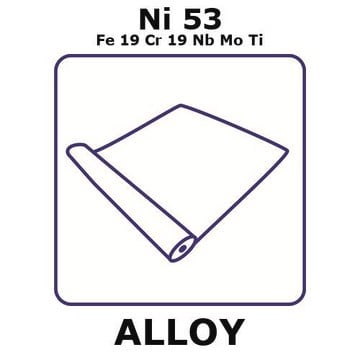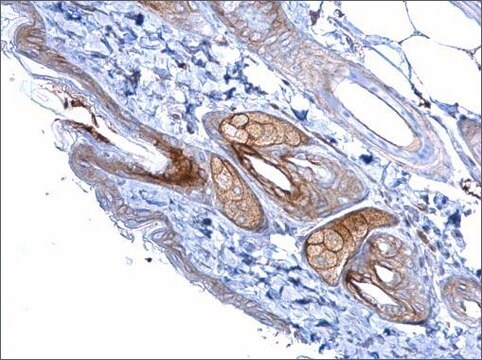SAB5900203
Alpaca Anti-hTNFR, recombinant single domain Antibody
Recombinant Alpaca(VHH) Nano antibody
Synonym(s):
CD120a, TNFR1, tumor necrosis factor receptor superfamily member 1A, tumor necrosis factor receptor type 1
About This Item
IF
IHC
WB
immunofluorescence: 1:100-1:300
immunohistochemistry: 1:100-1:300
western blot: 1:500-1:3000
Recommended Products
biological source
alpaca
Quality Level
recombinant
expressed in E. coli
conjugate
unconjugated
antibody form
affinity purified VHH antibody
clone
TR09, monoclonal
Assay
>95% (SDS-PAGE)
form
lyophilized solid
mol wt
14.2 kDa
~15-18 kDa (SDS PAGE under reducing condition)
purified by
immobilized metal affinity chromatography (IMAC)
species reactivity
human
concentration
1 mg/mL
technique(s)
ELISA: 1:1000-1:10000
immunofluorescence: 1:100-1:300
immunohistochemistry: 1:100-1:300
western blot: 1:500-1:3000
color
colorless
pH
( in PBS, pH 7.4)
isotype
VHH
Protein ID accession no.
UniProt accession no.
shipped in
ambient
storage temp.
2-8°C
target post-translational modification
unmodified
Gene Information
human ... TNFRSF1A(7132)
General description
Single-domain antibody (sdAb), also called nano-antibody, is the variable region isolated from the antigen-binding variable domain (VHH) of camelid heavy-chain-only antibody. It lacks light chains and a first constant domain(CH1). This configuration confers a number of unique advantages over conventional monoclonal antibodies. The small size of just 15 kDa (2~4 nm), single-domain antibody is the smallest antigen-binding fragment that can easily penetrate tissues, allowing them to bind epitopes that are inacessible to conventional antibodies. These single-domain antibodies offer superior chemical and thermal stability and increased solubility than conventional antibodies. All our antibodies are tested to ensure the highest level of specificity, sensitivity and reproducibility.
Specificity
Immunogen
Application
Packaging
Physical form
Reconstitution
Storage and Stability
Other Notes
Storage Class Code
12 - Non Combustible Liquids
WGK
WGK 1
Flash Point(F)
Not applicable
Flash Point(C)
Not applicable
Choose from one of the most recent versions:
Certificates of Analysis (COA)
Sorry, we don't have COAs for this product available online at this time.
If you need assistance, please contact Customer Support.
Already Own This Product?
Find documentation for the products that you have recently purchased in the Document Library.
Our team of scientists has experience in all areas of research including Life Science, Material Science, Chemical Synthesis, Chromatography, Analytical and many others.
Contact Technical Service
